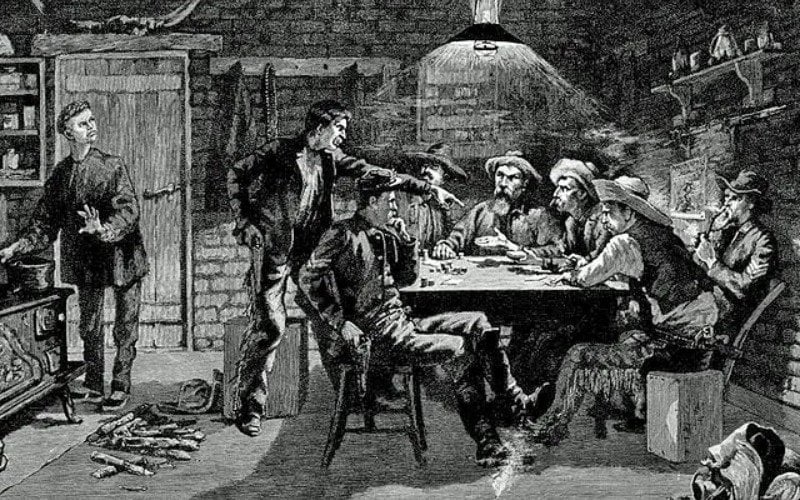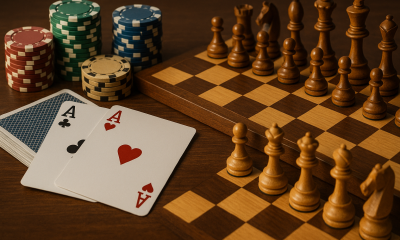around the world
The Role of Poker in American Wild West Lore

A scene in the Wild West wouldn’t be complete without a deck of cards and poker table. Poker is deeply entwined with Wild West lore, and this is not an invention of modern Hollywood films or Triple A video games. Gambling held a special place in the formative years of the American frontiers. And it was a time when many popular gambling games came to prominence in the US.
Yet poker was the greatest of them all, and became the choice of game for lawmen, pioneers, cowboys and outlaws alike. The outcome of games could easily end in gunfights or drunken brawls, and the best of the best rose to the forefront and have since become memorialised in America’s poker hall of fame.
Gambling in the Wild West
Gambling was widespread in the dusty towns of the frontier. Working men would frequently take to saloons, where the liquor was strong and the gaming tables held the promise of fortune. There were no formal casinos or gaming dens back then, as there were in Europe. In France, aristocrats would play baccarat or roulette in the palatial gaming courts, and it was only later that these games would reach the working classes. America, on the other hand, had a huge gambling culture in the working classes, that extended to the wealthy.
The wild west had dice games, and the original version of Roulette (with double-digit zero wheels). This was a time when Ouija boards and fortune telling games also became prominent. And by the late 19th century, the first slot machines, dubbed one armed bandits, were invented in the US. Dice games like Grand Hazard (a precursor to craps) and Chuck A Luck were also widely available.

Emergence of Poker
Card games were also available in abundance. “21” or blackjack, three card monte, and, the most popular, Faro, were widespread. Faro, a 17th century French card drawing game, peaked in popularity during the 19the century. Though Faro didn’t involve much strategy, the game revolved around drawing cards and if players got a match, they won. Poker, a technically more advanced and strategic game, gradually overtook Faro.
No games offered the same element of control and decision making as poker. Poker was destined to become a hit in the Wild West. The fast paced game, gave players the chance to raise tremendous stakes within one game. And with reputations to protect or live up to, players could easily end up throwing in all their money. Players could easily end up losing everything chasing their losses. And winners had to be wary of beating anyone carrying heat.
Legendary Poker Players of the Wild West
The most renowned poker player of the Wild West was Bill Hickok, or Wild Bill. Wild Bill earned his name for being a feared gunslinger and Civil War veteran. He survived numerous shootouts, and built quite the reputation for himself. But Wild Bill wasn’t just highly adept firing guns. He was also one of the best poker players in the Wild West. Several shootouts came as a result of him beating players at poker. Including the one that cost him his life.
In 1876, Wild Bill beat a player call Jack McCall and wiped him clean. The next morning, McCall came back to the poker table, went up to Wild Bill, and shot him in the back. Wild Bill died instantly, and his poker hand, a pair of black aces and two black eights, have since become known as the Dead Man’s Hand.
Then, there was Doc Holliday, a dentist turned gunfighter, who was a friend of Wyatt Earp. He participated in numerous fights and was also a ruthless poker player. Wyatt Earp, a lawman and buffalo hunter, was also a well known poker player of the time. Countless others enjoyed playing cards, and contributed to the legend of poker in the Wild West. And they weren’t all men either. Lottie Deno and Poker Alice both found success playing poker in the Frontier, shattering the association of poker as a man’s game.

Which Variants of Poker They Played
While nowadays, Texas Hold’em and Omaha are the two most popular forms of poker, back then, five card draw was the mainstream variant of poker. Games were often played with 20 cards, and didn’t always have dealers or pot limits. People would wager money or chips, but they could also play for cattle deeds, nuggets of gold or submit their personal belongings.
After the American Civil War, five card stud gradually took over. With three betting rounds, and each player holding a hole (face down) and door (face up) cards, the goal was to build the best 5-card poker hand. This variant of poker used the strategies that are found in Texas Hold’em and other modern games. Bluffing, anticipating the draw, and deceiving other players was all part of the game. And as such, the psychological elment of poker was more profound, which could easily prompt high stakes showdowns and brawls after the games.
Playing a mean game of poker was not enough on its own, in many cases. No, you would also need to have some muscle, or a weapon at the ready to defend yourself in case a player tilted and guns were drawn. The likes of Wild Bill, who were already feared gunslingers, could also lean on their reputation to give them an edge over jittery players.
Hustling and the Psychology of Wild West Poker
The Wild West was full of gamblers and opportunists looking to make quick money and move on. Stud poker, a game with such a tense psychological angle, could provide them with those opportunities. The few players who practised card counting and had rudimentary arithmetic skills had a massive edge over their peers.
With more strategy comes greater highs and losses. The highs are amplified in poker because your decision making contributes to the win, thus reinforcing your playing abilities. And losses can feel all the more painful, as they may be the result of a mistake or poorly judged decision.
So it was no wonder that poker games in the Wild West could escalate, and lead to potentially dangerous outcomes. Then, the opportunitsts could also come up with ways to con their opponents and rig games in their favor. Practices such as underhand dealing, conveniently placed mirrors, signals from partners, marked cards and stacked decks were not uncommon. And in those special circumstances were they were caught, the results could be deadly.
Sure, there would have been more laid back saloons where the gaming was amicable and never went beyond certain limits. But all it took was for someone like Wild Bill to come in, and the tables were turned. Gambling in the Wild West was not all about making money either. Players with a reputation could not turn down an opportunity to play cards, and it was seen as a kind of social currency or status symbol. A good poker player was intelligent and witty. Or, ruthless and cunning, depending on who you asked.

The Legacy of Poker in the Wild West
The Wild West certainly brought poker and faro to the forefront of gambling. Faro has since disappeared, replaced by games such as video poker or alternate variants of poker that use a similar drawing mechanic. And poker has just powered on to new heights. Texas Hold’em, arguably the most popular version of poker today, was created in the early 20th century. Made Texas, it quickly spread to Vegas, and became big at venues like the Golden Nugget. The first boom came in the 1970s, with the establishment of the WSOP tournaments, and then the next came in the 2000s, with the rise of online poker rooms.
We can argue though, that poker wouldn’t have caught on as it did without the influence and legacy of the Wild West. The mystical intrigue and legendary figures such as Wild Bill and Doc Holliday helped popularise, and to some extents, glamorise poker. And to this day, when we look back at the Wild West, most gamers will think of five card draw or the Dead Man’s Hand.











